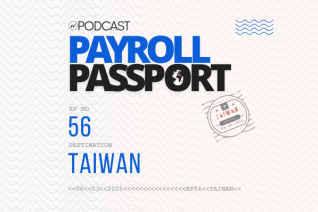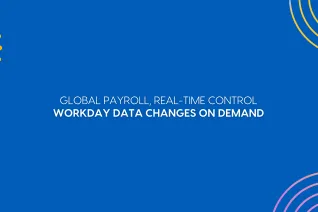Country Spotlight: Payroll in Chile

You've poured your heart and soul into expanding your business to Chile. The mercado (market) is buzzing, your team is energized, and success seems within reach. Then, payroll hits. A wave of acronyms (FONASA, AFP, UTM, ISAPRE) and unfamiliar regulations crash over you, leaving your head spinning faster than a cueca dancer.
The complexities of Chilean payroll have tripped up more businesses than the treacherous slopes of the Andes. The intricate web of tax calculations, social security contributions, and compliance requirements can bury even the most enthusiastic entrepreneur. But don't worry, this isn't a payroll pesadilla (nightmare).
This blog will unravel the mysteries of payroll in Chile, helping you navigate its complexities confidently.
ALSO READ | Chile: A Guideline to Payroll and Employer of Record
The Chilean Payroll Puzzle
Navigating the Chilean Tax Labyrinth
At the heart of Chile's income tax system lies the Unified Tax Unit (Unidad Tributaria Mensual—UTM), a value regularly adjusted for inflation. As of July 2024, the UTM value is 65,967 Chilean pesos (CLP). This moving target forms the basis for payroll taxes, requiring constant vigilance to avoid costly errors. If you miss an update, you could face employee withholding mistakes and potential fines.
Chile's progressive income tax structure adds to the complexity. As an employee's income increases, so does their tax rate, a system that demands meticulous calculation and record-keeping.
But income tax is just the beginning. Employers must also navigate a web of additional withholdings as part of the employer contribution:
- Pension Fund Contributions: Currently 10% of an employee's gross salary
- Health Insurance Contributions: 7% of gross salary, split between public FONASA and private ISAPRE plans
- Unemployment Insurance: 0.6% of gross salary for employees on indefinite contracts
Each has its own set of rates and regulations, creating a multifaceted challenge for payroll processors.
DOWNLOAD | Building Resilient Global Payroll Models for the Future of Work
Demystifying Social Security Contributions
Chile's social security system resembles a complex ecosystem, with contributions flowing to multiple institutions:
- AFP (Administradoras de Fondos de Pensiones) for private pensions
- ISAPRE (Instituciones de Salud Previsional) for private health insurance
- FONASA (Fondo Nacional de Salud) for public health coverage
- Mutual de Seguridad for occupational accident insurance
- AFC (Administradoras de Fondos de Cesantía) for unemployment insurance
Keeping track of each institution's contribution rates, reporting requirements, and deadlines can feel like juggling while walking a tightrope. For instance, Chilean law mandates that employers provide workplace accident and occupational illness insurance, a detail easily overlooked by those unfamiliar with Chilean payroll compliance.
ALSO READ | Protecting Paychecks: Importance of cybersecurity in payroll
Beyond the Paycheck: Additional Payroll Considerations
Currency conversion adds another layer of intricacy. While some companies may pay employees in foreign currencies, all payroll calculations must be performed in Chilean Pesos. This necessitates careful attention to exchange rates and introduces an extra step in the payroll process.
Employee contracts introduce yet another variable. Individual agreements may stipulate specific bonuses, overtime pay, or fringe benefits that must be factored into payroll calculations to ensure compliance with legal requirements and protect employee rights. For example, overtime in Chile is typically paid at 150% of the regular hourly rate, but this can vary based on contractual agreements.
Ensuring Compliance: Avoiding Costly Penalties
The stakes are high when it comes to payroll compliance in Chile. Calculation errors or missed deadlines can result in penalties from tax authorities and social security institutions. For instance, late payment of social security contributions can incur fines of up to 50% of the unpaid amount. Beyond financial repercussions, inaccurate or late payments can severely damage employee trust and morale.
Employers must also contend with regular reporting obligations to the Chilean Internal Revenue Service (SII). These reports detail payroll taxes and social security contributions, and they have strict deadlines and accuracy requirements. Monthly declarations must be submitted by the 12th of the following month, a deadline that can sneak up on unprepared organizations quickly.
Bridging the Language Gap
For many international organizations, the language barrier presents a significant hurdle. Official documents, regulations, and communications are primarily in Spanish. Without Spanish-speaking team members, understanding and complying with these resources becomes an additional challenge, increasing the risk of misinterpretation and non-compliance.
DOWNLOAD | Navigating the Most Common Payroll Processing Challenges
Navigating Chilean Payroll Regulations
To successfully manage payroll in Chile, organizations must stay current with several key areas:
- Minimum Wage: As of 2024, the monthly minimum wage in Chile is 500,000 CLP for workers aged 18-65.
- Working Hours: Employees are typically expected to work 45 hours, with overtime pay regulations requiring 150% of regular pay for extra hours.
- Leave Entitlements: Employees are entitled to 15 working days of annual leave after one year of service. Maternity leave extends to 18 weeks, while fathers receive five days of paid paternity leave. Sick leave and parental leave are just some of the aspects to consider.
- Public Holidays: Chile observes 16 public holidays annually, which must be factored into payroll calculations.
- Social Security Contributions: Accurately calculate and remit both employer and employee contributions, which can total over 20% of an employee salaries.
- Income Tax: Apply the progressive tax system correctly, staying updated on UTM values and tax brackets.
- Fixed-term Contracts: Be aware that fixed-term contracts are limited to one year for most workers and two years for managers or those with professional/technical degrees.

Simplifying Chilean Payroll with Expert Support
The intricacies of Chilean payroll can be daunting, but they don't have to be a barrier to your organization's growth. This is where partnering with a global payroll expert like Neeyamo can make all the difference. Neeyamo offers comprehensive solutions tailored to the unique challenges of payroll in Chile:
- Automated tax calculation tools that stay updated with the latest UTM values and tax brackets
- Multilingual support for navigating Chilean regulations and communicating with local authorities
- Real-time currency conversion for organizations paying in foreign currencies
- Compliance monitoring to help avoid costly penalties and maintain good standing with Chilean authorities
By leveraging Neeyamo's expertise, your organization can navigate the maze of tax calculations, foreign social security contributions, and compliance requirements with confidence. This allows you to focus on what really matters – growing your business in Chile's dynamic market.
Don't let payroll complexities hold you back. With the right partner, you can turn this challenge into an opportunity for efficient, compliant operations in Chile and beyond. Whether you're just starting to explore payroll in Chile or looking to optimize your existing processes, Neeyamo's tailored solutions can help you master the intricacies of Chilean payroll and drive your business forward.
Latest Resources
Stay informed with latest updates
If you're curious and have a thirst for knowledge pertaining to the HR, payroll, and EOR universe, don't miss out on subscribing to our resources.















